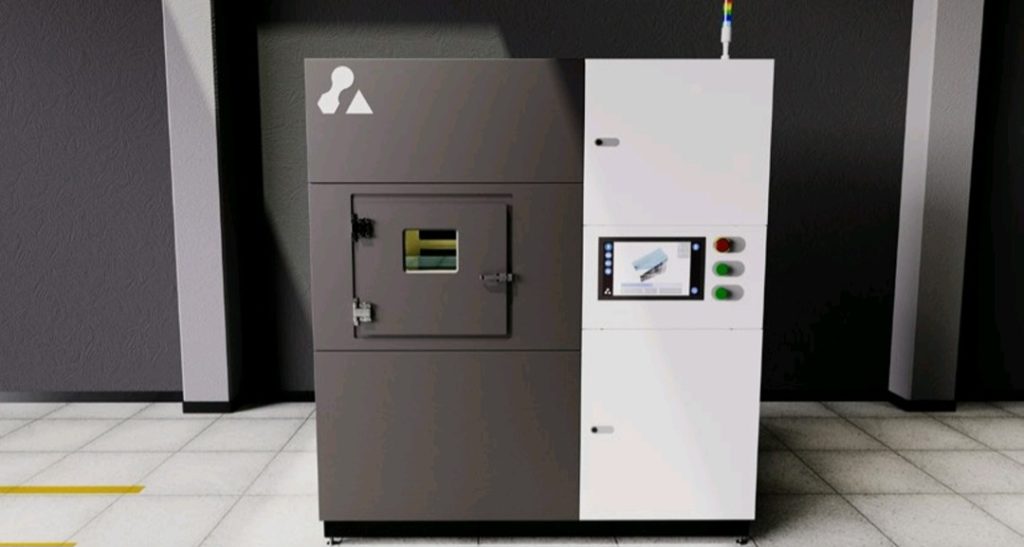Australian metal 3D printer manufacturer Aurora Labs has introduced its new AL250 metal 3D printer at Formnext 2023.
With this launch, the manufacturer has transitioned from the RMP-1 metal 3D printer to the newly introduced AL250 laser powder bed fusion machine (LPBF). The target market for these machines includes defense, aerospace, oil and gas industries, engineering specialists, and OEMs managing libraries of complex parts in bespoke production runs. Demonstrating the strength and flexibility of the system to a broader market relies on its capacity to address complex issues with parts through generative design and subsequent printing on the AL250.

Vote now in the 3D Printing Industry Awards 2023.
Accelerating prototyping and production with MCP technology
The AL250 technology stands out for its bidirectional recoating of the powder bed, which is made possible by Aurora Labs’ patented Multi Concurrent Printing (MCP) technology. Serving a dual purpose, this approach reduces recoat time and allows for longer laser exposure. AL250 is designed to expedite and streamline prototyping and production processes for various industries. Specifically, it aims to offer a faster and more cost-effective means of creating custom parts or components that are typically difficult to manufacture using traditional methods.
At the heart of the AL250’s functionality is its distinctive powder dosing mechanism, which assumes a central role. By subjecting the powder to conditioned heating before deposition into the recoating system, the system ensures optimal temperatures, facilitating the spread and densification of the powder layer during construction. Aiming to mitigate mechanical defects within parts, this meticulous control over powder layer consistency guarantees a high-quality, repeatable build.
Moreover, the AL250 integrates a build plate heater capable of reaching 200°C, expanding capabilities for materials research. Stringent environmental control processes in the AL250 enable real-time monitoring of gas flow, temperature, and humidity during printing in the build chamber. The AL250 boasts leading lasing power at 1500W per laser, particularly advantageous for processing highly reflective or conductive powders like copper. Users can effectively process a variety of powder materials by purchasing the machine’s efficient and optimized process parameters.

Technical specifications of AL250 3D printer
| Build Envelope | 250 x 250 x 300mm (x,y,z) |
| Layer Thickness | 30 150 μm |
| Laser System Options | 1500W (CW) |
| Max Scanning Speed | 20m/sec |
| Spot Diameter | 75-150 μm |
| Laser Wavelength | 1064nm |
| Bed Pre-heating | 200°C |
| Connected Load Approx Power Consumption | 25A |
| Power Supply | 3/n/PE AC 400V, 32A |
| Inert Gas | Ar or N2 (external generator optional) |
| Dimensions | 2220 x 1300 x 2480 (WxDxH) |
| Weight | 1700kg |
| Operating Conditions | 18 – 30°C |
| Recoating Systems | Variable speed recoating system |
Read all the 3D Printing Industry coverage from Formnext 2023.
What does the future of 3D printing for the next ten years hold?
What engineering challenges will need to be tackled in the additive manufacturing sector in the coming decade?
To stay up to date with the latest 3D printing news, don’t forget to subscribe to the 3D Printing Industry newsletter or follow us on Twitter, or like our page on Facebook.
While you’re here, why not subscribe to our Youtube channel? Featuring discussion, debriefs, video shorts, and webinar replays.
Are you looking for a job in the additive manufacturing industry? Visit 3D Printing Jobs for a selection of roles in the industry.
Featured image shows the AL250 metal 3D printer. Photo via Aurora Labs.



